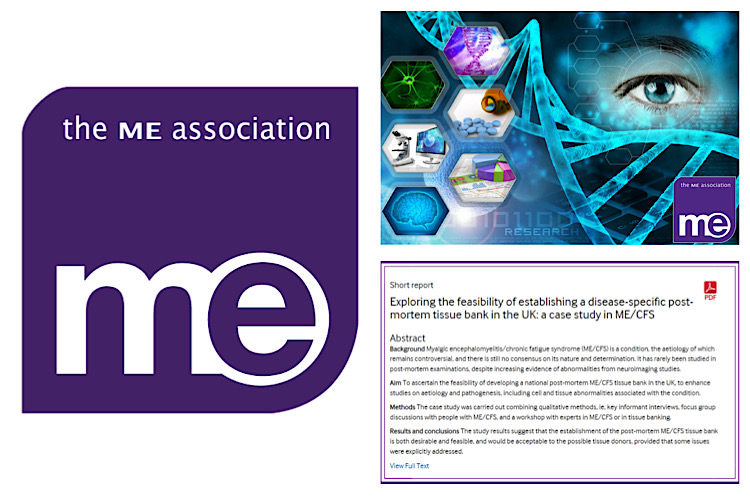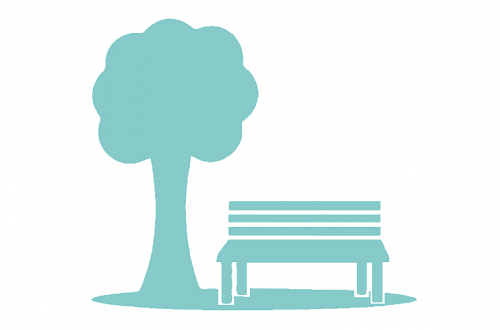research : Post Mortem Tissue Bank …
Research : Post Mortem Tissue Bank …
© ME Association …
Donate your post-mortem tissue …
The UK ME/CFS Post Mortem Tissue Bank and Tissue Donation
The ME Association is the only M.E. charity involved in the collection of post mortem tissue samples from people diagnosed with the disease in the UK.
Our long-term aim is to establish a national ME/CFS Post Mortem Tissue Bank where greater numbers of samples can be collected and stored for vital research.
 UK Post-Mortem Feasibility Study
UK Post-Mortem Feasibility Study
In 2010, ME/CFS experts including those from The London School of Hygiene and Tropical Medicine, who currently run the M.E. Biobank, published a feasibility study that concluded:
“The establishment of the post mortem ME/CFS tissue bank is both desirable and feasible, and would be acceptable to the possible tissue donors.”.
Current situation
Plans to set up a formal ‘bricks and mortar’ post mortem facility are currently on hold. This is due to the enormous cost such a project would incur and the continuing cost of launching and maintaining the UK ME/CFS Biobank.
In the meantime, we are continuing to work with a consultant neuropathologist at Addenbrooke’s Hospital in Cambridge in arranging post mortems on an individual basis when we are notified that someone has died and the person has made it clear that they want to donate their body to ME/CFS research (see below).
Existing research
A number of post mortems have now taken place in the UK and some interesting findings have been formally reported.
These include the presence of dorsal root ganglionitis or inflammation in bundles of nerve cells in the nerve roots that transmit sensory information back to the brain via the spinal cord.
In 2010 we presented these preliminary findings at a research conference in Australia – Pathology of Chronic Fatigue Syndrome: Pilot Study of Four Autopsy Cases – that concluded:
“Thorough histopathological study of cases coming to autopsy may help to confirm or refute the hypothesis that ME/CFS is a disease process and whether the symptomatology may be explained by inflammation of the sensory and autonomic divisions of the PNS [peripheral nervous system].”
- See also: a related newspaper article from 2010 which includes comment from Mrs Criona Wilson – mother to Sophia Mirza whose autopsy was part of the study.
Additional research on post mortem tissue samples is expected with funding having recently been approved for a small genetic study. All such studies are subject to availability of samples and, as ever, to funding restraints.
However, we regard post-mortem research to be one of the more neglected areas of ME/CFS research and are very keen to support the establishment of a dedicated ME/CFS Post Mortem Tissue Bank along similar lines to those tissue banks currently available to other forms of chronic disease.
Donating Post Mortem Tissue
The Statement of Intent
If you would like to donate post mortem tissue for ME/CFS research then you need to make this clear in writing in a Statement of Intent:
- Download the statement of intent and ensure it is completed in full.
- Keep the completed form with your Will or in a Codicil to your Will.
- Your next of kin or executor will also need to know about this instruction and where they can locate it.
One of the most important practical aspects in the whole process of post mortem tissue collection is for someone (i.e. next of kin or solicitor) to notify the ME Association as soon as possible after a death has occurred.
This is because the sort of research that is being done at present requires removal and fixation of very specific tissues as soon as possible, preferably within 24 hours – and this obviously requires consent and cooperation from relatives, coroners, and pathologists at a very sensitive time.
Different procedures may apply once the ME/CFS Post mortem Tissue Bank has been established.
What does donating your body tissue to medical research involve?
This would normally consist of removing very small samples of brain, nerve and muscle tissue at the time a post mortem takes place and normally at a local hospital. Afterwards the post mortem the body will be returned for burial or cremation.
The extracted tissue samples are then fixed and transported by courier to a neuropathologist in Cambridge who arranges for their examination and storage.
If we manage to establish the ME/CFS Post mortem Tissue Bank, the type of tissue samples being removed may be extended to include other body organs.
Head over to The ME Association read more and to donate in order to help accelerate the project.

© ME Association
fragmented.ME xXx





